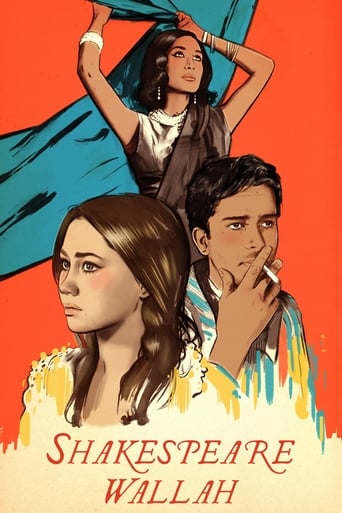Gypsi Bates
Lizzie Buckingham (Felicity Kendal) is the teen-aged daughter of a roving acting couple (played by her real life parents, Geoffrey Kendal and Laura Liddell) in India during the 1960s. Lizzie falls in love with Sanju (Shashi Kapoor) who seems to reciprocate her feelings, but he is also having an affair with the jealous actress Manjula (Madhur Jaffrey).Loosely based on the true life of the Kendal family, this second collaboration of Merchant, Ivory, and Jhabvala is perfection. The cast is talented and natural, the plot believable and beautifully written, the film-work graceful and personal. The Shakespeare references may be problematic for some, but regardless, I recommend this movie whole-heartedly.
eyesour
The exquisite mood captured by this masterpiece is unique in my experience of motion pictures. "Colonial rule" in India was not English, but British. The many Irish, Welsh and Scots who lived and died in India would hate to be called English. However, the dedicated husband and wife thespians are eccentrically English, of course. Their daughter, Lizzie, has never been outside India, and knows less of England than Sanju, the man she thinks she loves. The action is not set during the last days of the Raj, as reported in some reviews. Nabokov's "Lolita", which is pointedly displayed early in the film (perhaps because it is also about the seduction of one culture by another), was first published in 1955, and Indian Independence took place in 1947. Sanju drives a white Mercedes, which I wouldn't like to date, but which is very definitely post-1955. The film was made in 1965. The rise of Bollywood must have been taking place at about this time. Much of the delicate ambiance of the film is totally lost if the audience is misled into believing that India was like this before Independence. Only the ghost of the Empire lingers on in this quiet story. It is not really about a "clash" of cultures, with the violent hostility which that word implies; rather, it gently acknowledges that the old order is changing, giving place to a new. Indian potentates no longer personally strangle unwitting intruders for entering their women's quarters. I hope not, anyway. The lives of Lizzie's parents are irrevocably inter-woven with a vanished time: they will die in India. Because Lizzie has no place in the new India, she has to be sent away to a home she doesn't know. Her Indian playboy friend cannot commit himself to marrying her.Nevertheless, the truth is that in spite of the mockery directed against the theatre of Shakespeare by a more aggressively volatile element, very many actors on the imperial stage conceived a genuine love of India, and its high and ancient civilisation, and this affection could be recognised and reciprocated, and still is, in some parts. The love affair is, even today, not yet wholly extinct, at least at some levels. This is an infinitely more nuanced work than David Lean's rather nasty and one-dimensional interpretation of E.M.Forster's shallow "Passage to India". Ruth Prawer Jhabvala, who wrote the screenplay of Shakespeare Wallah, displays a far finer spirit, greater precision and deeper humanity. Separation at any age is also a loss.
MartinHafer
"Shakespeare-Wallah" is a rather wistful view of the last remaining vestiges of British India. The film is set less than two decades after the independence of India and follows a small company of British expatriates who travel this huge nation putting on Shakespearean productions. The problem is that with the British Empire a thing of the past, interest in India in Shakespeare has clearly waned and the new king of entertainment, Bollywood, is contrasted in the film. It's all a bit sad for some to look at these people desperately trying to hold on to the past--though others, such as modern Indians, might look at things VERY differently. As for this American, it's a strange film as you are looking at a movie that glamorizes the past--a past folks in my country cannot relate to nor appreciate. My guess is that this film (directly, oddly, by an American, James Ivory) would be much greater appreciated by older Brits who can remember when India was the crown jewel, so they said, of the Empire.As for the quality of the film, the acting and direction are good though the pace and subject matter of the film left me flat. Not a bad film but a far cry from the beautiful Merchant-Ivory productions to come. I did notice that the style of the film and focus on more ordinary folks was reminiscent of the films of Satyajit Ray and not like the more contemporary Indian musical we've come to expect from this nation.
Tim O'Grady
This early (if not first) Merchant-Ivory collaboration anticipates what the team was later able to do with larger budgets and color cinematography. Set in post-independence India, it tells the story of a small, though thoroughly professional traveling Shakespeare company fallen on hard times. The troop, built on the talents of the three Buckingham family members, including the young and fetching daughter Lizzie, is slowly dissolving in a culture increasingly hostile to their art and readier to worship the queens of the silly Indian pop cinema.The main thread of the plot concerns a rather thin romance between Lizzie and a young Indian playboy quite under the thumb of a local movie vixen named Manula. Meanwhile we are given snippets from various Shakespeare plays: Hamlet, Othello, Twelfth Night, Romeo and Juliet, Antony and Cleopatra.Fine B&W photography, though much in this film seems dated now.



